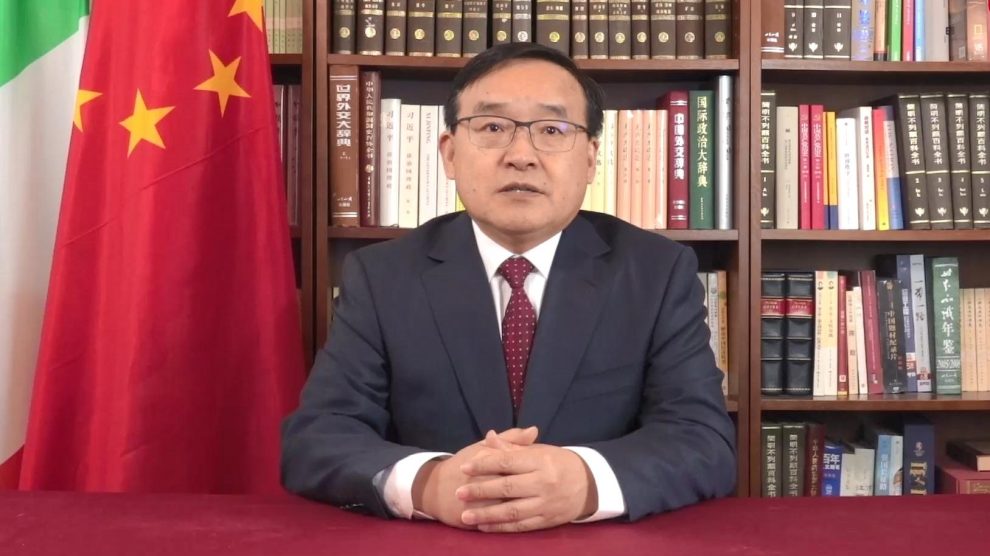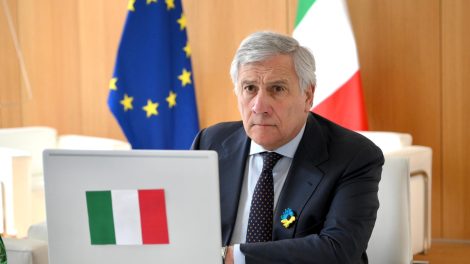Jia Guide bets on the economy. In an interview with Il Sole 24 Ore, the leading Italian financial paper, the Chinese ambassador to Italy turned to trade data to explain why the Italian government ought to stick with the Belt and Road Initiative. The Memorandum of Understanding that underpins Italy’s adherence is set to auto-renew in March 2024, unless the executive says otherwise by year’s end.
- The MoU was signed in 2019 by the government led by Giuseppe Conte. Italy was the only G-7 country to adhere to it. Since then, Rome has been deviating from the Silk Road and distancing itself from the increasingly assertive China.
- Although Prime Minister Giorgia Meloni is not speaking publicly about the BRI at this stage, she had called the MoU “a big mistake” on the election campaign trail – and her team has signalled that a renewal is unlikely.
Beijing’s charm offensive. Chinese officials have been reacting to Italy’s cooling affection by pivoting to the economy (including through concealed advertorials in Il Sole 24 Ore). In the interview, Mr Jia highlighted that Italian exports to China “grew by 42% between 2019 and 2021, far exceeding the levels before the signing” of the MoU. Since Rome and Beijing signed the agreement, bilateral trade volume has touched nearly $78 billion in 2022.
- Also, Italy is the EU country “with the largest number of agreements on agricultural exports to China” and has “actively participated in China’s international trade fairs,” he continued…
- … warning that “these achievements are inseparable from the signing of the MoU, which is not a legally binding agreement but reflects the political will of the two parties to strengthen mutual concrete cooperation in various fields.”
It takes two to tango (or else). “China attaches great importance to the partnership with Italy,” remarked Mr Jia. “We are willing to restart the dialogue mechanism, harnessing the potential of cooperation in green, digital and third-party markets and continue to promote mutual investment. I recently met with the heads of several Italian government departments who are open to attracting Chinese investment.”
- “We never pursue trade surplus and we want to develop a balanced relationship with Italy,” he added, noting that China is “willing to offer a good and stable environment for all companies, including Italian ones,” and hopes that “the Italian government also provides a fair and non-discriminatory business environment for Chinese companies in Italy.”
Some fact-checking. First off, as Bloomberg also noted, the MoU “has not led to deeper integration between Italy and China compared to other EU nations.” And the interchange between the two has indeed increased, but despite the ambassador’s words, the trade balance is heavily tilted in China’s favour.
- The latest data from the Foreign Affairs Ministry shows that Italian exports to China have grown less substantially than expected, from 13 billion in 2019 to 16.4 in 2022.
- Conversely, Chinese exports to Italy have skyrocketed: from 31.7 billion in 2019 to 57.5 in 2022 (especially electronics, clothing, and machinery).
- Thus, China is Italy’s second-largest supplier with an 8.2% market share, but Italy remains a secondary trading partner for China as the 22nd customer and 24th supplier worldwide.
It is political after all. The stakes for Beijing are indeed commercial, as export data shows, but remain highly political, as China strives to maintain a G-7 country inside the BRI, its infrastructure and investment-cum-influence and soft power project. And given that political pressure is not exceedingly efficient, especially as the EU aims to de-risk from China by curbing strategic imports, Beijing is leveraging its economic ties to convince the Italian government not to drop the MoU.
- “Many far-sighted leaders in Europe have launched clear signals, in line with the fundamental interests of their own countries and the European side,” said Mr Jia, referring to French President Emmanuel Macron’s recent controversial words on the EU disengaging from the escalating China-US tensions.
- “I believe that these actions will inject more stability and positive energy into the world. Italy has long been at the forefront of EU countries’ cooperation and trade with China: it is also an active promoter of the development of China-EU relations. We expect it to continue to play a constructive role,” ends the interview.
Image: Cri.cn





